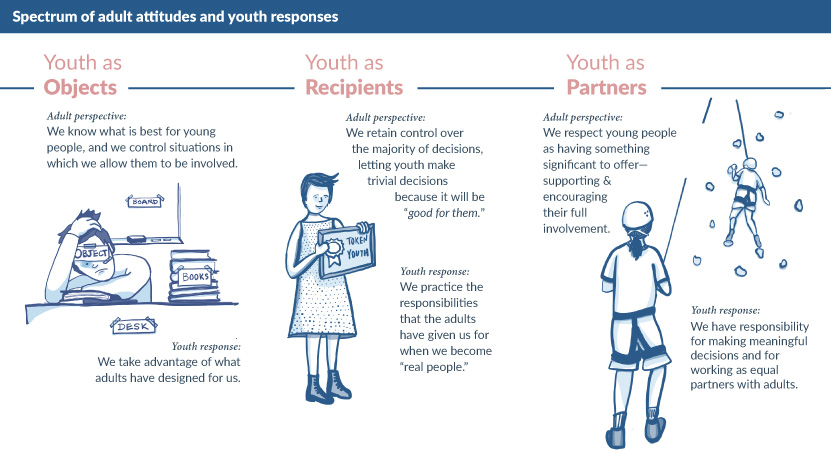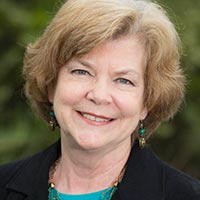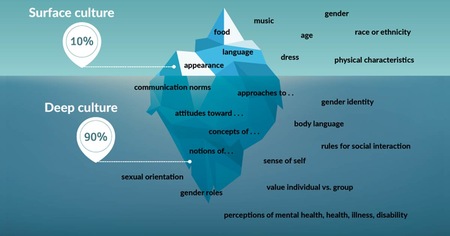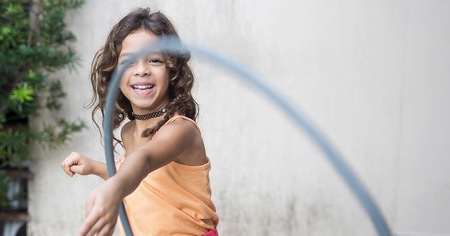In the old approach, youth were offered limited, token chances for leadership. In the new approach, programs are structured as youth-adult partnerships with power and responsibilities shared between the youth and the adult professionals.
The image below illustrates this shift in attitude. It represents a positive change in youth development theory and practice. It recognizes that youth are ready to take on active leadership roles, yet they still need adult guidance and support.

One of the biggest challenges for out-of-school professionals is learning how to transition from "teachers" to "facilitators" as children grow into adolescents.
How can adult leaders prepare themselves to authentically share power with youth, while scaffolding new skills in the youth themselves?
Ken Jones, extension professor at the University of Kentucky, observes that both the adult leaders and the youth may be reluctant at first to enter into a full partnership. Adults may be reluctant to allow youth to make decisions that may result in mistakes. At the same time, youth may be reluctant to voice their strong opinions in the presence of adults whom they fear might resent critical comments.
Jones recommends starting with separate training for the adults and the youth, with a leader experienced in developing youth-adult partnerships. In the initial training, he suggests that these common fears be addressed. The next training should be a joint training with both groups as they learn how to structure the partnership.
Be prepared to spend a significant amount of time discussing ground rules. It's a good idea to create a written contract listing the responsibilities of both the adults and youth. These ground rules should be posted and referred to frequently as both groups get accustomed to their roles. Above all, adult leaders need to spend more time listening than talking. They need to allow youth to make decisions, take responsibility for following through, and learn from their successes and their mistakes.
In a survey conducted by the Search Institute in 2014, youth expressed how they want to be treated.
Show respect.
"Take me seriously and treat me fairly."
Give voice.
"Ask for and listen to my opinions and consider them when you make decisions."
Respond to needs.
"Understand and adjust to my needs, interests, and abilities."
Collaborate.
"Work with me to accomplish goals and solve problems."
Youth development professionals should reflect on how they can use the physical environment, the daily schedule, and routine communications with youth to create an atmosphere that invites them to share power and responsibility.
Sharing power with youth is not about turning the controls over completely and immediately. It is a gradual process of being invitational, developing relationships, assisting the youth in learning leadership and decision-making skills, and supporting and guiding their efforts.
Want to learn more about positive youth development topics and receive professional development credit? Penn State Better Kid Care, in partnership with the University of Nebraska Extension, provides free online professional development modules accessible anytime, anywhere, for child care and school-age professionals. Approximately 100 hours of school-age professional development are available, including topics in PYD, SEL and STEM. These modules are approved for professional development in 48 states.
To access the modules, visit Penn State Better Kid Care.
There is no charge to read the content, view the videos, and download and print the activities. To take the assessment and receive a certificate of completion, you will be prompted to pay a $5 fee.
 Eileen Wise is a youth development specialist at Penn State Better Kid Care and primary author of the PYD series.
Eileen Wise is a youth development specialist at Penn State Better Kid Care and primary author of the PYD series.
References:
Penn State Better Kid Care module: "PYD Foundations: Youth Engagement"
Search Institute. 2014. "A Research Update from Search Institute: Developmental Relationships." Search Institute.




